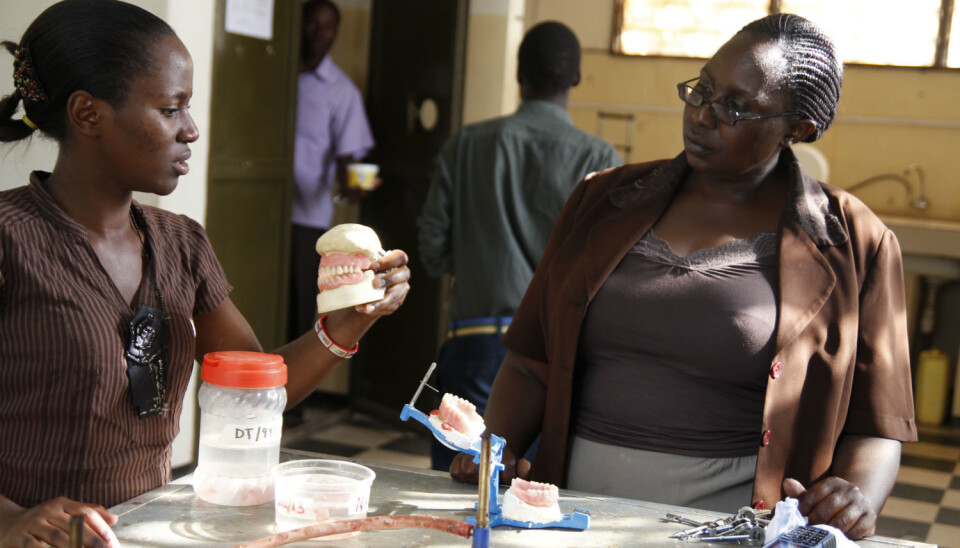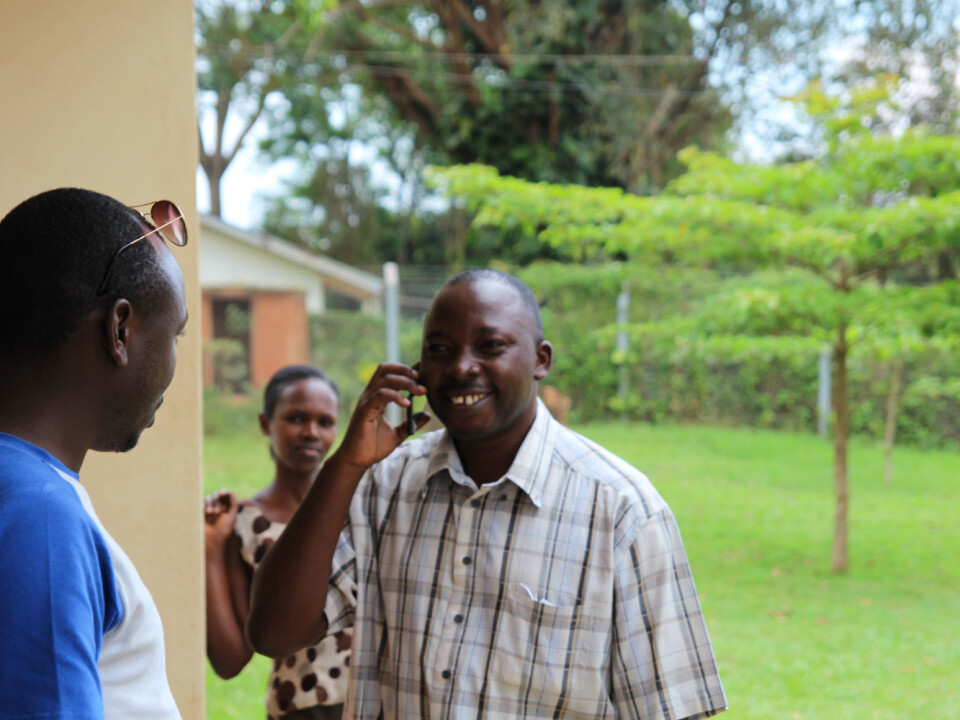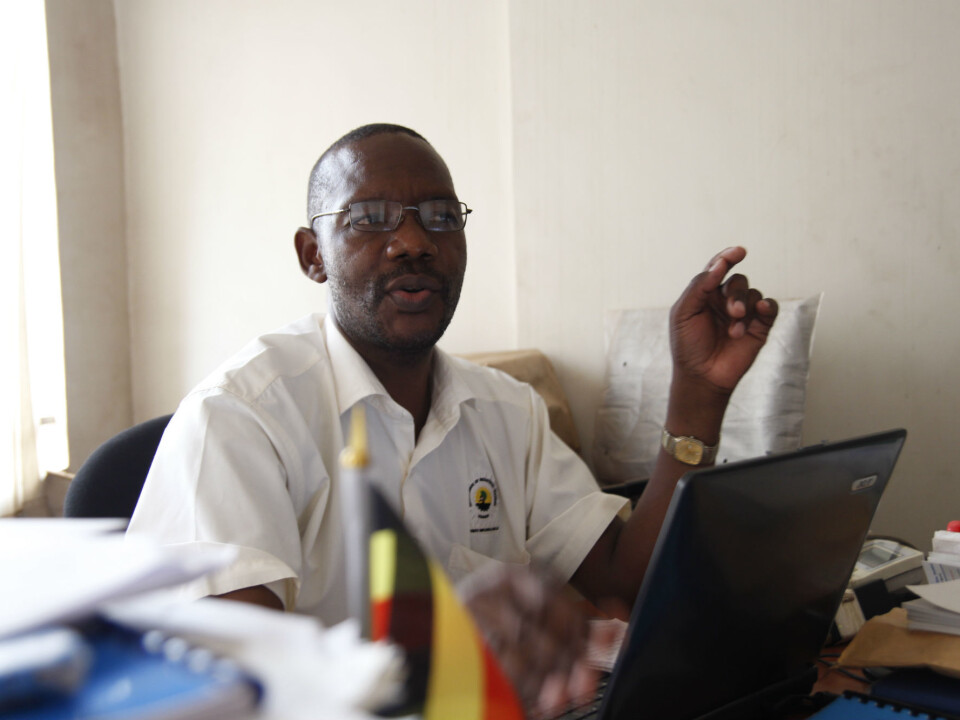This article was produced and financed by Diku - The Norwegian Agency for International Cooperation and Quality Enhancement in Higher Education

Aim to improve the educational system in Uganda
"Uganda has an urgent need for qualified workers to generate development and growth. This means that our entire education system has to become more practically orientated," says Ugandan lecturer.
Chris Serwaniko welcomes us to "NOMA House" at Kyambogo University, which is in a rural location 10 kilometres from central Kampala, Uganda.
Serwaniko is a lecturer in art and design, and is also coordinator of the NOMA Master's degree in vocational pedagogy. The university has developed this along with the university in Juba (South Sudan) and Oslo and Akershus University College of Applied Sciences (HiOA).
"We realised that we needed to build capacity in vocational training, including teacher training, in order to provide training which harmonises better with the needs of industry. That's how the NOMA Master's degree started up," Serwaniko explains.
New pedagogy
Kyambogo University offers higher-level vocational training and teacher training and educates both school teachers and practitioners of various vocational subjects.

Serwaniko says that until recently the whole environment was typified by conventional teaching methods which were typically teacher and exam-orientated.
In contrast the "NOMA pedagogy" includes excursions to workplaces and vocational schools, data gathering, group work and discussions.
Ronny Sannerud, professor in the Department of Vocational Teacher Education at Oslo and Akershus University College of Applied Sciences HiOA, is the Norwegian coordinator of the vocational pedagogy partnership with Kyambogo. He believes that the NOMA master's degree has produced good results on many levels.
"Vocational pedagogy as an idea and specialist field is now relatively well anchored among the personnel at Kyambogo and has support in top management. The degree of implementation has been good, which means that Uganda now has a ‘critical mass’ of expertise in the field."
Produces changes

Chris Serwaniko points to Skilling Uganda, a 10-year national strategy which was launched in October 2012. Its aim is to strengthen vocational teaching, business and innovation. But, as he points out, writing ambitions down on paper and translating them into reality are very different things.
"Many of our NOMA graduates now contribute to change on many levels. Some are school leaders and others work for the government. This is how we contribute to changing teaching and training so they are better suited to meeting the requirements," Serwaniko says.
"In addition, teachers who are trained at Kyambogo go straight into the schools sector. This means that they also affect what happens in vocational teaching at lower levels," he adds.
The first student intake was in 2008. Three cohorts have now graduated, almost 60 graduates in total. The partners had to develop the whole subject from scratch as there is no master's degree in vocational pedagogy anywhere in East Africa.
"Vocational teaching in Uganda has been left to itself when it comes to studies and research. There were no valid answers to the subject's pressing questions. We also viewed this master's degree as a place to do further research into the challenges of the subject, not least its weak links to industry. The aim is to improve vocational teaching," Serwaniko says.
From dentist to principal
It is evident from several master's dissertations which have been submitted that the link between education and industry is weak.
Before Grace J. Aninge took the NOMA master's degree in vocational pedagogy she worked as a teacher and teaching supervisor at Uganda's only school of dentistry. Today she is principal at the Mulago Paramedical Schools, of which the school of dentistry is part.
She dreams of changing education in the country.
"The fact that I got the rectorship is solely due to my NOMA master's degree. It has been extremely important and relevant for me," Aninge says. She distinguished herself as a clever dentistry student and got a job as a clinical instructor at the school as a result.
"I was a skilled dentist, but had no teaching skills. Unfortunately I am a classic example in that way. But during my NOMA studies I developed my pedagogical skills and really began to like teaching. There are frighteningly few of us genuine educators in this country, particularly in health subjects. "
Aninge wrote about pedagogical principles and practices at Mulago Paramedical Schools for her NOMA master's dissertation.
"I found that there is a weak link between the qualification and the requirements of working life. The students receive theoretical teaching in the schools, but the great challenge is about skills. What's traditional, still applies: The teacher is the boss and the students must follow him."
Open atmosphere
As principal, Aninge has introduced changes inspired by the NOMA master's programme.
She would like to make the courses even more student-focussed, but faces challenges in the form of few staff and a heavy workload. In addition many of the teachers are dentists rather than actual educators – as she was before NOMA.
"Our education system is still only slightly practically orientated; it simply feeds the students with knowledge in order to pass exams, not genuine skills. I realised that we need to change this during my NOMA studies," says Aninge.
Developing new syllabus
Joseph Kikomeko has principal responsibility for developing a new curriculum for the entire field of vocational training in Uganda. He came into the position as Principal Qualifications Officer at The Directorate of Industrial Training straight from the NOMA master's degree in vocational pedagogy.
Kikomeko wrote his master's dissertation on vocational teaching's relevance to working life in Uganda.
"Company managers typically said: 'Yes, we employ graduates, but they need a lot of training'. So I demonstrated that there was a wide gap between the teaching and working life. I am now working to close that gap. The vocational training needs to become more practically orientated," he says.
Changes come slowly
The new syllabus also includes practical tasks, which is completely new. The plan is to reach all public vocational institutes so that people can change. There are around 150 public vocational schools and many more private ones.
This kind of skills-based syllabus and teaching is now increasingly entering the entire education system.
"But a lot of people fight against it and want to have the old, well-known system based on listening and writing and not much doing. People are changing, but slowly," Kikomeko says.
"When I took my degree in electrical engineering a teacher proudly entered the classroom with an advanced measuring instrument. But he couldn't get it to work. That's symptomatic. What we Ugandans lack is skills. We have knowledge, but we can't transform knowledge into action. "
Closer cooperation
Lecturer Chris Serwaniko agrees that the graduates have learnt a lot and generally get good jobs, but he is not completely satisfied. The link to working life has remained too weak.
"We need to find mechanisms to work more closely with industry," he says.
The idea is that companies will be included as genuine partners, contribute to defining training requirements and design course plans.
"With these three new NORHED cohorts we hope to have a solid base of new results and proposals which can contribute to changing vocational teaching. We will have built capacity here at Kyambogo and at other teaching sites, plus at policy level. Our work can contribute to improving vocational teaching in the whole country," Chris Serwaniko says.
He believes that the knock-on effects may be great as the students come from a wide range of occupations and professional backgrounds and the teaching resources come from several institutes.
"We also have a plan to start our own PhD programme, with international partners. The idea is to generate research so we can better see: Where are we now, where are we going and how will we get there?"
From talk to action
Professor Ronny Sannerud stresses that although they are "traditional", the students' master's dissertations have contributed a lot of new and important knowledge about the field of vocational pedagogy in the country, and that the two NOMA buildings give the milieu a central location.
"With all these results NOMA has been necessary for our further work in the NORHED programme. We now have to make the leap from talking to taking action, to introducing changes both in vocational schools and workplaces. In action research improvement and development work go hand in hand with research," Sannerud says.
Ugandan employers’ associations and trade unions are involved in the revised master's programme, which admits its first student intake in August 2014. Finding oil in Uganda makes education in national vocational expertise extra important, Sannerud emphasises.
So far it does not appear that the education cooperation is being affected by the controversy surrounding Uganda's implementation of the so-called "anti-gay law".


































